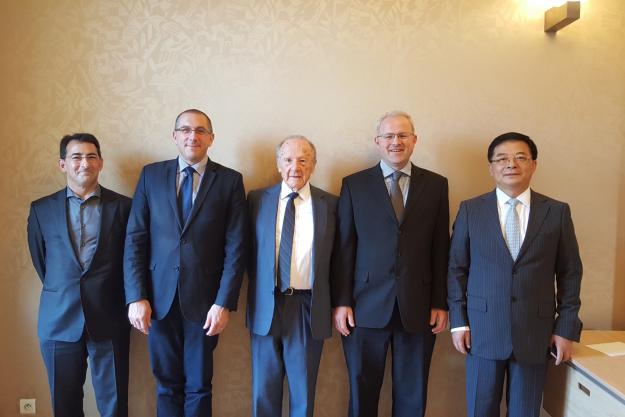
From left to right: Dr Jonathan Forman (OPCW Science Policy Adviser and Secretary to the SAB), Dr Augustin Baulig, SAB member from France, Professor Matthew Meselson, Harvard University, Dr Christopher Timperley, SAB Chair from UK, Mr Cheng Tang, SAB Vice Chair from China.
The science behind treatment and response to chemical agent exposure was the focus of a workshop convened by the Scientific Advisory Board (SAB) of the Organisation for the Prohibition of Chemical Weapons’ (OPCW), held at the Maison de la Chimie in Paris, France from 26-27 September.
We are delighted that many internationally-recognised experts in the medical treatment of chemical weapons injuries have chosen to share their expertise to alleviate the suffering of any future casualties of these unlawful and inhumane weapons explained Dr Christopher Timperley, the SAB’s Chairperson.
The workshop gathered 48 scientists from across the globe to discuss toxicology and medical response to chemical warfare agents. Among them was Professor Meselson of Harvard University, co-director of the Harvard Sussex Program on CBW Armament and Arms Limitation and a highly distinguished expert on biological and chemical weapons defense and arms control. He said of the meeting: “This workshop, along with other activities of the OPCW, brings together people who otherwise might not be able to meet and discuss the scientific aspects of chemical disarmament. No doubt that without them, the Convention would not be as successful as it has been and continues to be.”
Over the two days, experts reviewed the state of knowledge and current practices in toxicology, clinical recognition, decontamination, medical countermeasures and long-term treatments in response to chemical warfare agent exposure. The presentations included discussions on gaps in knowledge and ongoing research toward more effective approaches.
“Developing more effective responses to chemical agent exposure is essential to more than just the critical task of saving lives. The less effective chemical agents become, the less desirable they are for those seeking to use them to do harm,” said Dr Jonathan Forman, OPCW Science Policy Advisor and Secretary to the SAB.
The event was organised jointly by the OPCW and the General Secretariat for Defense and National Security of France (SGDSN), and made possible through generous financial support from the European Union and the SGDSN.
This was the second of four workshops to be convened during 2016 and 2017 to inform the drafting of the SAB’s report on Developments in Science and Technology. The document will be presented during the 2018 Fourth Review Conference on the Operation of the Chemical Weapons Convention (CWC).
The Scientific Advisory Board consists of 25 independent experts from the OPCW Member States. It advises the OPCW Director-General on science and technology issues relevant to the implementation of the CWC, including science relevant to assistance and protection.
For more details:
- OPCW Scientific Advisory Board
- SAB Workshop in support of the report to the Fourth Review Conference: focus on chemical forensics
- Report from the workshop on chemical forensics
